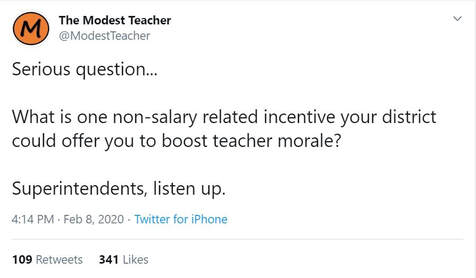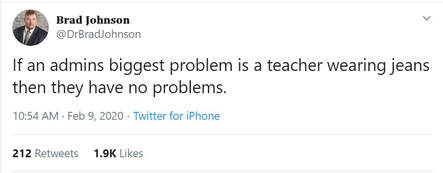|
By Ryan Tibbens
Public school teachers will attend tens of millions of hours of division-prescribed professional development this year. Almost none of it will help teachers learn more about ‘what’ to teach and ‘why’ to teach it. Nearly all of it will focus on ‘how’ to teach. That is ridiculous.
First, let’s acknowledge the power of pedagogy and honing one’s craft. Teachers should be constantly learning and sharing methods, increasing their arsenal of strategies to engage and affect an increasingly distracted and diverse student body. Teachers must also work purposefully to learn about new technologies and how to implement them (or not) in order to build “21st Century Skills.” Professional development must always include a consistent and sincere focus on pedagogy.
However, ‘how’ to teach is useless if the teacher does not know ‘what’ to teach or ‘why’ to teach some topics in depth, others in brief, and others not at all. Because teachers have traditionally been regarded as gatekeepers of knowledge, and because the first requisite qualification for work is a college degree in the discipline, many people falsely assume that teachers already know enough about their content. That is patently untrue.
Before we even worry about content-specific knowledge, let’s consider teachers’ general academic aptitudes. On average, teachers scored below average on the SAT when they were in high school. 54% of elementary teaching candidates fail the Praxis I test on their first try. Most data indicate that teachers have an average IQ of, well, around average. Praxis II (content-specific test) data is harder to come by, but even basic score ranges indicate great variation and suspicious pass rates. I’ve heard more teachers make the “Cs get degrees” joke than I care to count.
I’m not arguing that teachers are stupid. Most teachers are smart, hardworking, and functional in the classroom. Approximately 10% of teachers earned SAT scores in the top 20% (still a striking underrepresentation though). I’m simply arguing that teachers, on average, are average (particularly in lower grade levels). And we can all probably agree that, on average, we don’t remember too much detail from our own public schooling. But that’s what college is for, right? Uh-oh. Check out what the National Council on Teacher Quality found in a survey of elementary teacher preparation programs:
The teacher does not need to be the most intelligent person in the room based on IQ, but the teacher does need to be the most knowledgeable, the most aware, and the most (justifiably) confident. I remember being in classes when there was no doubt that the teacher was in the bottom half based on IQ and only somewhere around the top quarter based on content knowledge – it was the worst part of school for me.
So what do we do? Let’s get real. Let’s stop pretending that pedagogy and technology are the only things that teachers need to be trained on. If we’re going to sit through dozens of hours of mandatory professional development each year, is it crazy for a couple days to address content knowledge? Public school leaders always talk about creating “life-long learners” and “critical thinkers,” but how is that a likely outcome when teachers don’t learn more about their content? How can we promote interdisciplinary connections and PBL if we don't learn more about the other subjects their students study? If you don’t know stuff, you can’t think stuff; and if you can’t think stuff, then you can't do much. Let’s empower our teachers.
Pedagogy is great. Technology is fine. But if we spend all our time worrying about “how” to teach without supporting “what” and “why,” then we’ve done our teachers, our taxpayers, and, most importantly, our students a great disservice. Bring back content-based professional development to inspire teachers’ curiosity, passion, and overall performance.
0 Comments
By Ryan Tibbens
Short Form:
I was recently shocked and amazed and horrified by certain responses to a popular tweet that read “Serious question... What is one non-salary related incentive your district could offer you to boost teacher morale? Superintendents, listen up.” Around 20% of the early responses focused on wearing jeans to work. Are you fucking kidding me? Administrators: Quit bitching about teachers wearing jeans. And quit charging money to wear jeans – that’s not even a sensible fundraiser. That’s it. Just shut up and deal with real problems. Teachers: Quit bitching like your pants are your most severe professional problem. If jeans are actually among your biggest concerns, then one of these statements is true: 1) You work in a nearly perfect school, are compensated well, have students who are well cared for and prepared, and have full community support (i.e. You’re delusional); or 2) You are too damn stupid to identify real problems and prioritize them, and, as a result, you should not be teaching. That’s it.
The Great Teacher Jeans Debate.
Some of you just rolled your eyes: “Not again.” Others had a very different response: “What debate? They’re just jeans…” Interestingly, both responses are appropriate. A tweet by @ModestTeacher helped bring this “problem” to my attention. Modest Teacher writes, “Serious question... What is one non-salary related incentive your district could offer you to boost teacher morale? Superintendents, listen up.” Through a bit of luck and selective memory, I was generally unaware that teachers’ legwear is such a contentious issue. I quickly scrolled through the hundreds of comments/replies to his tweet and counted no fewer than 20 comments about jeans, possibly more. Reducing class sizes, giving teachers unencumbered planning time, and increased autonomy are the only topics that appear to have received more support, and their counts are only marginally higher than jeans. Somehow, this is a big deal, but it shouldn’t be. Let me explain. In some school divisions, the school board, superintendent, or building administrators have made rules against teachers wearing jeans to work. In some places, the policy is sacrosanct. I recently saw this post in a private principal/administrator group on Facebook: “Sadly, I just have had a staff diagnosed with cancer. Staff wants to raise funds. Original though was pay to wear jeans, but jeans are a no. Other ideas?” That principal went on to clarify that it is a district-wide policy; the rule is absolute with no exceptions or adjustments.
I student-taught at a high school that had a strict faculty dress code: men must wear button-down shirts with ties, dress “slacks,” no visible tattoos, no facial hair. At all. I had a friend who worked in a neighboring school and had to wear long sleeves, athletic compression sleeves, or gauze bandages to cover a beautiful tattoo on her forearm – as though making a 6th grade teacher look like a recent suicide survivor was less concerning than body art. As a student teacher, I had no choice in my placement, so I objected to the facial hair rule, and once they made that exception, I took the liberty of wearing a polo shirt on Fridays (and sometimes Mondays). The principal was quite serious too. After student-teaching there in the early spring, I was hired as a long-term substitute at the end of the year. The principal called me into his office to discuss the dress code (I kept using my modified version), general “professionalism,” and a picture of me holding a plastic disposable cup on my MySpace page (STFU, I’m old). After making passive aggressive assaults on my shirt, beard, and social media presence, he offered me a full-time job beginning the following fall. He saw no humor or irony. Since the quality of my work warranted a job offer, despite my “unprofessional” appearance, I took the additional liberty of wearing jeans on my final two Fridays at that school.
At my first full-time teaching position, the principal was relatively strict about pants as well. During my tenure there, at least two teachers were stricken with cancer and one birthed a child with severe disabilities. In response, the school community rallied together and supported each person in need – through paid “Jeans Days.” The concept was simple – Pay $5 (or maybe it was $3 at first), and wear jeans to work, with all funds going to the faculty members in need. I never really objected to helping those people, but the idea that my pants somehow affected my work was patently ridiculous. I made a habit of wearing jeans on “Jeans Day” without putting my money in the collective jar (I occasionally paid; other times, I slipped a few bucks directly into those teachers’ mailboxes. Sometimes I didn’t pay at all). I have no problem helping coworkers in need. What I have a problem with is the idea that I should pay to wear a pair of cotton pants textured differently than my normal cotton pants because one texture is somehow better for education.
Let’s be clear – pants CAN matter, but usually they don’t. In arguing that the “Jeans Debate” is stupid, I’m not arguing that we should entirely disregard pants. Assless chaps, thong bikinis, Daisy Dukes, or stinking, dirty, unwashed pants can present actual impediments to learning. But how are blue cotton jeans substantively different from tan cotton khakis? Sometimes people say, “Dress for the job you want, not the job you have.” That’s how you can spot the future administrator-wannabes early – too many suits, too many pleats. For me, dressing for the job I want would mean sweatpants or mesh gym shorts or loose, comfortable khaki shorts – the job I want is “retired.” But the analog to that is dressing for the job I have. The job I have is educating high school students, a job I can perform better when the students find me both professional and relatable. Things 16-year-olds don’t find unprofessional? Jeans. Things 16-year-olds don’t find relatable? Pleats.
As we push for more and more motion in the classroom, more “active” learning, more kinesthetics, it seems reasonable for teachers to be comfortable enough to move. This is one more reason that PE teachers are the smartest people in any high school – they receive the same pay and benefits but do a small fraction of the planning, grading, and remediation of core content teachers AND they get to wear warm-up pants and shorts all the time. If a PE teacher can wear comfortable pants because they dress appropriate for their tasks, then I ask you: shouldn’t an English teacher wear whatever kind of wild Bohemian, beatnik writer bullshit he wants? Or maybe he’s thinking about reading… so he should wear pajamas. Right?
If you are a public school administrator who feels that jeans must either be banned or paid for, I have bad news for you – you’re an idiot or asshole. Maybe both. You probably have several thousand things that are more important, more pressing, in your building (namely, students). I started out by saying that I’ve had the good luck to forget all about the jeans controversy, and that is because I’ve spent nearly ten years working in a great school that prioritizes students and education. Our administrators focus on things that matter, and while professionalism certainly matters, wearing iconic American pants is not interpreted as a problem. If you are a public school teacher who feels that wearing jeans is among your top professional needs or priorities, I have bad news for you – you’re an idiot or asshole. Maybe both. You probably lack the big-picture awareness necessary to accurately identify your students’ needs, your own professional needs, or the needs of your school system. You probably lack the intelligence and critical thinking necessary to teach students well. You also probably lack the attention span and reading skills to have made it this far down the page. EVERYONE – FOCUS ON THINGS THAT MATTER. Jeans don’t matter. (And yes, I’m fully aware of the irony of writing something like this about something that doesn’t matter.) |
Read.Think.Write.Speak.Because no one else Archives
December 2021
Categories
All
|



 RSS Feed
RSS Feed